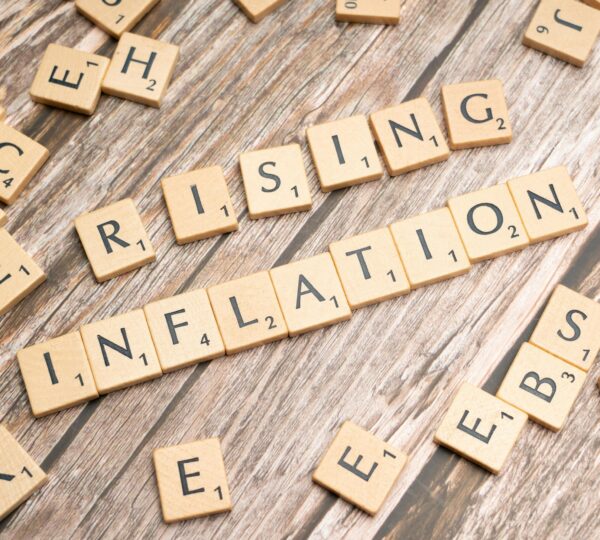
The impact of inflation on your finances
Just a few years ago, a trip to the grocery store was a routine errand, nothing to worry your head about. The prices of staples like bread, milk, and eggs were relatively stable, and people could easily plan their budgets with a reasonable degree of certainty. However, recently, there has been a persistent and continuous shift as the cost of living has steadily increased. Prices of various items from groceries, clothing to real estate have been rising. This rise in prices, known as inflation, has had a major impact on the finances of households and individuals.
In this post, we’ll explore how inflation affects your daily expenses, long-term savings, and overall financial health, along with actionable tips to help you manage these rising costs.
What Is Inflation?
Before diving into how inflation affects your finances, let’s clarify what inflation is. Inflation refers to the gradual increase in the prices of goods and services over time. When inflation occurs, your purchasing power decreases, meaning the same amount of money buys you fewer goods than it did before.
Economists measure inflation by looking at price changes for a basket of commonly used goods and services—like food, housing, and transportation—tracked by the Consumer Price Index (CPI). For example, the U.S. inflation rate was 3.7% in August 2023 , indicating a sharp rise compared to previous months. A small amount of inflation is natural and even considered healthy for economic growth. However, when inflation skyrockets, it can create financial challenges, especially if wages don’t keep pace with rising costs.
How Does Inflation Affect Your Daily Bills?
The impact of inflation on your finances is most noticeable when it comes to everyday bills. Let’s break it down:
- Utility Bills: The cost of energy and utilities tends to rise with inflation, especially when fuel prices increase. Natural gas prices rose by 20% year-over-year in 2022, according to the U.S. Energy Information Administration , significantly affecting household budgets.
- Grocery Bills: You may have noticed your grocery cart costing more while holding fewer items. As production and transportation costs rise, retailers pass those expenses on to consumers. The U.S. Bureau of Labor Statistics reported that grocery prices rose 11.8% in 2022, the highest annual increase in over 40 years .
- Housing Costs: Rent prices often increase in line with inflation, particularly in urban areas. According to Zillow, U.S. rent prices rose by 5.8% in 2023, pushing housing costs even higher for tenants . If you’re a homeowner, inflation can also affect your mortgage if you have an adjustable-rate loan.
- Insurance Premiums: From health insurance to car insurance, inflation can drive up premiums. The Kaiser Family Foundation found that health insurance premiums increased by 4% in 2023, adding another strain on household budgets .
- Transportation Costs: Whether you’re driving or using public transport, inflation pushes up the price of gasoline and fares. In mid-2023, gas prices increased by 6.1% from the previous year , impacting daily commutes and travel expenses.
Long-Term Effects on Savings and Investments
- One of the most insidious ways inflation affects your finances is by eroding the value of your savings over time. If inflation rises faster than the interest your savings account earns, the real value of your money diminishes.
- Savings Accounts: A low-interest savings account might earn you 1% annually, but if inflation is 3.7%, you’re effectively losing purchasing power each year. This makes it harder to save for long-term goals like buying a house or retirement.
- Investments: While inflation can hurt savings, certain investments might provide a hedge against inflation. Stocks, real estate, and Treasury Inflation-Protected Securities (TIPS) offer returns that outpace inflation in the long term. A study by Vanguard shows that stocks typically deliver inflation-adjusted returns of 7% annually, making them a useful tool to maintain purchasing power .
Credit and Debt: The Hidden Impact of Inflation
Inflation doesn’t just affect how much you spend; it can also have a profound impact on your debt and credit.
Interest Rates: Central banks often raise interest rates to curb inflation. In 2023, the Federal Reserve raised rates by 0.25% to 5.5% , the highest in over two decades. If you have variable-rate debt—like a credit card or an adjustable-rate mortgage—your monthly payments could increase, leaving you with less disposable income.
Loan Repayment: On the flip side, if inflation continues while your loan payments remain the same, you’re essentially paying back your loan with “cheaper” money. However, this only benefits you if your income keeps pace with inflation.
How to Protect Your Finances from Inflation
Here are some practical, research-backed tips to combat inflation:
- Create a Budget: With rising costs, tracking your expenses becomes even more critical. A 2022 study by Deloitte found that 71% of consumers adjusted their budgets to combat rising inflation .
- Build an Emergency Fund: Inflation can create unpredictable expenses. Experts recommend having 3-6 months’ worth of living expenses saved to cushion against financial shocks .
- Invest Wisely: To offset inflation’s impact on your savings, consider diversifying your investments. Financial advisors recommend allocating 60% to stocks, 30% to bonds, and 10% to TIPS for optimal inflation protection .
- Shop Smarter: Pay attention to price changes and shop strategically. Bulk buying, using coupons, and shopping during sales can help counteract rising prices.
- Reevaluate Your Debt: Focus on reducing high-interest debt. If possible, consider refinancing to a fixed-rate loan to lock in lower rates.
The Silver Lining: Inflation and Assets
While inflation can feel like a financial burden, it can also benefit those who hold certain types of assets. For instance:
Real Estate: Property values typically rise with inflation. In 2023, real estate prices increased by 8.6% , meaning homeowners are likely to build equity faster.
Stocks: Companies often raise prices during inflationary periods, leading to higher profits. Research by Morningstar shows that stocks historically outpace inflation .
Conclusion: Planning for the Future
Inflation may be out of your control, but taking proactive steps can help you protect your finances:
- Review and adjust your budget regularly.
- Pay off high-interest debt quickly.
- Diversify your investments to maintain purchasing power.
- Build a strong emergency fund to handle financial shocks.
By staying informed and making strategic decisions, you can navigate inflation’s impact on your finances and secure a more stable financial future.
Citations
U.S. Bureau of Labor Statistics. “CPI Summary, August 2023.”
U.S. Energy Information Administration. “Natural Gas Price Changes.”
Kaiser Family Foundation. “Health Insurance Premiums 2023.”
Zillow. “Rent Price Trends 2023.”
Vanguard. “Inflation-Adjusted Stock Returns Study.”












